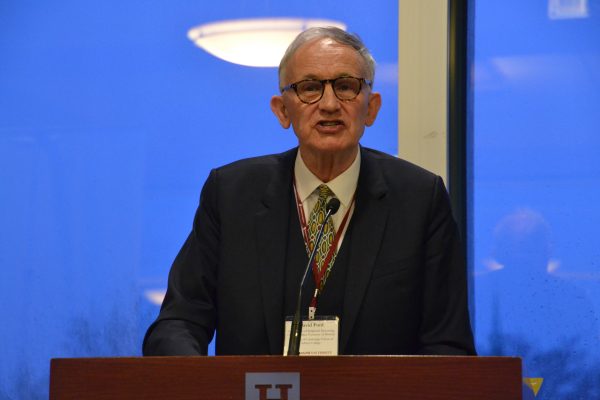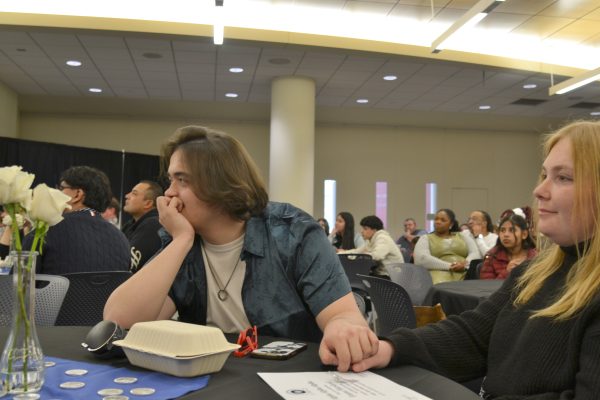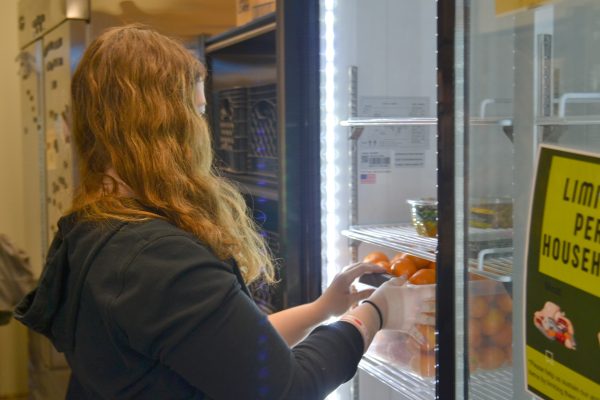Facing food insecurity in the new year
The Feed Your Brain Campaign is on campus to make sure students have access to the food they need.
October 11, 2018
Senior An Garagiola, senior Emma Kiley and 2018 graduate Elise Hanson started Feed Your Brain in the spring of 2017, upon listening to concerns from fellow students who reported their troubles accessing the healthy food they needed. This sparked them to found the organization and initiate multiple projects designed to combat food insecurity.
One such project is bringing the Keystone Foodmobile to campus once a month.
“The Foodmobile comes once a month, and it’s here for two hours, which we’re finding isn’t quite enough time, because we always have to turn students away,” Kiley said. “For example, it came to campus [on Sept. 27], and we were able to serve around 35 students, but we had to turn away like 15.”
However, when the Foodmobile first came to campus, this was not the case.
When the Foodmobile first came to campus, “we kind of had people just, like, trickling in, ‘cause people didn’t really know about it,” Kiley said. Now, however, students can be found lined up, waiting for their turn to use the Foodmobile.
The expansion of awareness, however, means that only so many students have a chance to access the Foodmobile before it must move on to its next location.
“It is pretty much like a bus, and then it has, like, a refrigerator and a freezer inside of the bus that has… dairy products and eggs, and different meat products as well,” Kiley said. “It’s like a food pantry, everything is free, you just fill out a form one time and then you go in and shop for your free food.”
Eligibility to use the Foodmobile is determined by the federal poverty guidelines.
“For students who are just like a household of one, essentially, they have to be making around no more than $24,000 a year,” Kiley said.
Since Feed Your Brain began, it has also distributed two campus-wide surveys regarding food access, one in spring 2017 and the other in spring 2018.
“From the first survey, we found that around 76 percent of the undergraduate respondents noted of being food insecure, and that was not what we were expecting at all,” Kiley said.
This summer, Feed Your Brain worked with a biostatistician from the University of Minnesota, who helped them analyze the survey results in greater depth. Her findings indicated that 80 percent of students reporting food insecurity were students of color, and students from minority groups were more likely to report food insecurity.
Feed Your Brain has also hosted two pop-up pantries, funded through Hamline’s Sustainability Office.
Nancy Victorin-Vangerud, Chaplain and Director of the Wesley Center, with whom Feed Your Brain collaborates, spoke of the importance their projects hold to her faith.
“As a United Methodist chaplain, whose religious tradition holds a table and meal at the center of our ritual practice, I care deeply that there is a welcoming, healthy, and sustainable food culture in our campus community,” Victorin-Vangerud said.
“The long-term goal of Feed Your Brain is to have a permanent food pantry on campus, that is open for all students to use several days a week,” Kiley said. “We are working with HUSC and the Dean of Students office and also the Wesley Center to institutionalize this goal, so that even if Feed Your Brain as a student org doesn’t exist in a couple of years, there can still be a food pantry.”
Professor Susi Keefe, Feed Your Brain’s faculty adviser, praised the members of Feed Your Brain for their activism on campus.
“This group listened to students on our campus and took action. They are living their values. They are creating change,” Keefe said.





